八年级上册 Units 9-10-【精品课件】备战2024年中考英语一轮复习教材梳理(人教版)
文档属性
| 名称 | 八年级上册 Units 9-10-【精品课件】备战2024年中考英语一轮复习教材梳理(人教版) | 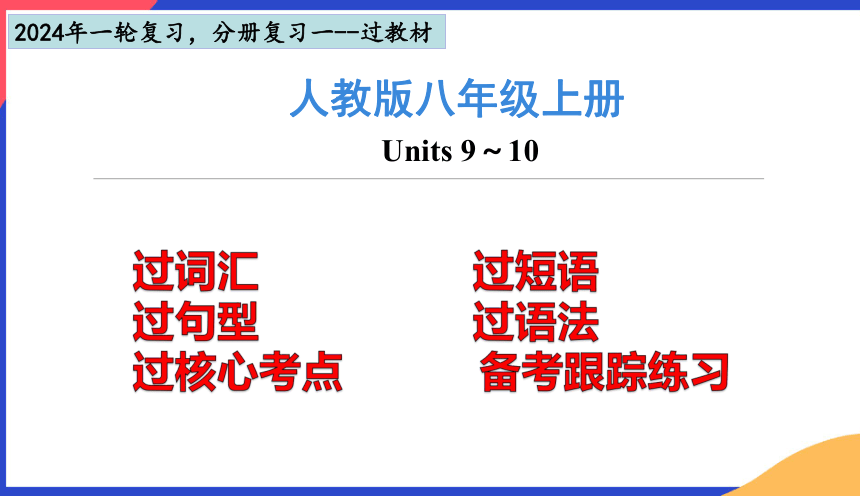 | |
| 格式 | pptx | ||
| 文件大小 | 1.7MB | ||
| 资源类型 | 试卷 | ||
| 版本资源 | 人教新目标(Go for it)版 | ||
| 科目 | 英语 | ||
| 更新时间 | 2024-03-05 08:16:00 | ||
图片预览

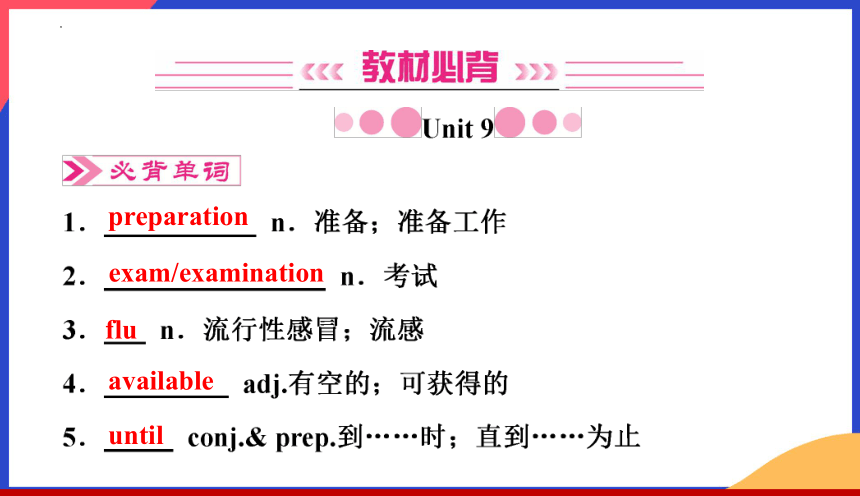
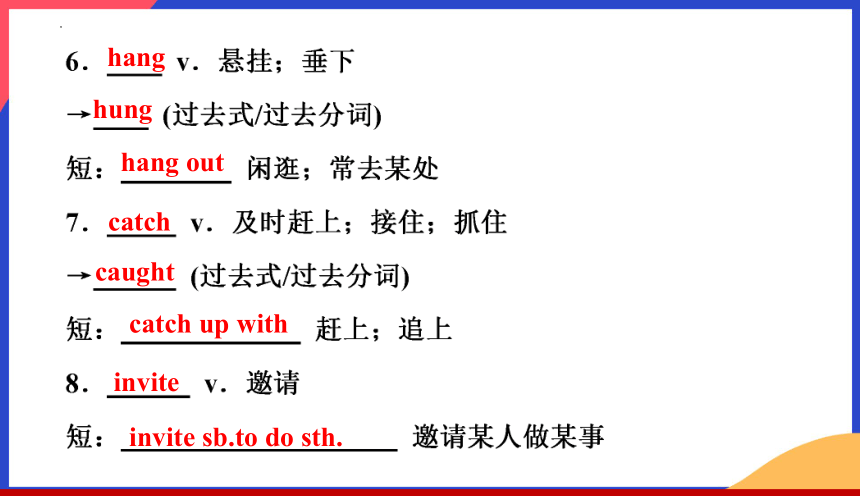
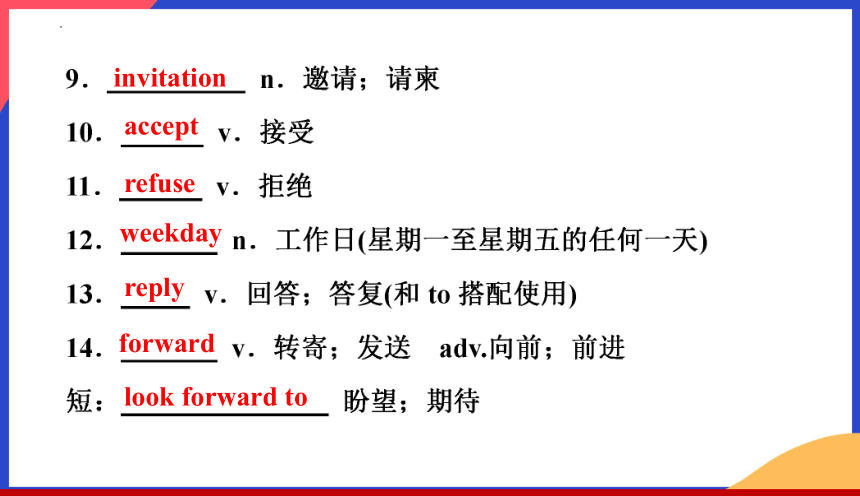
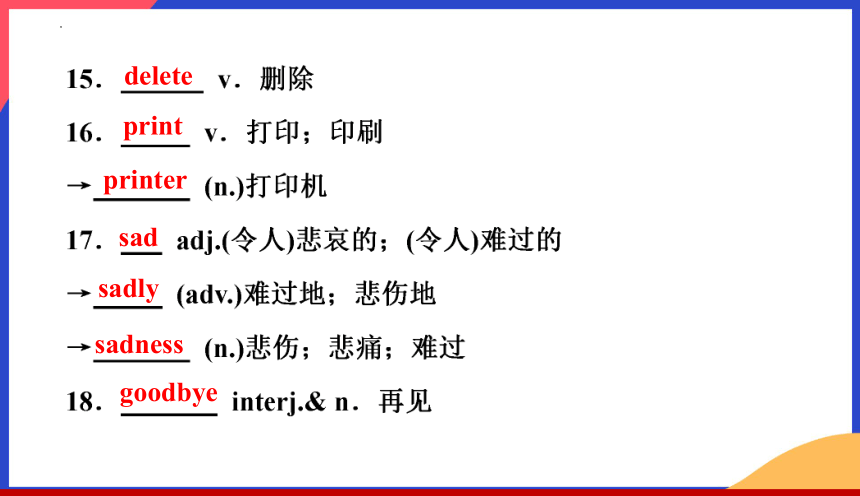
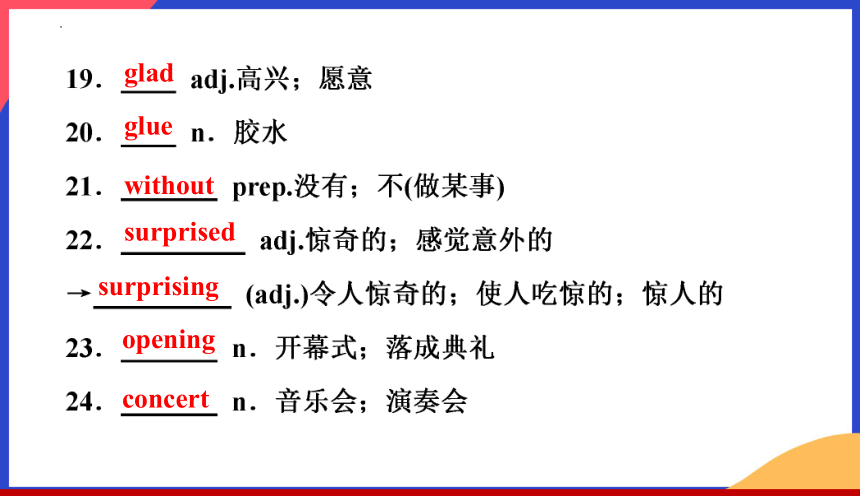
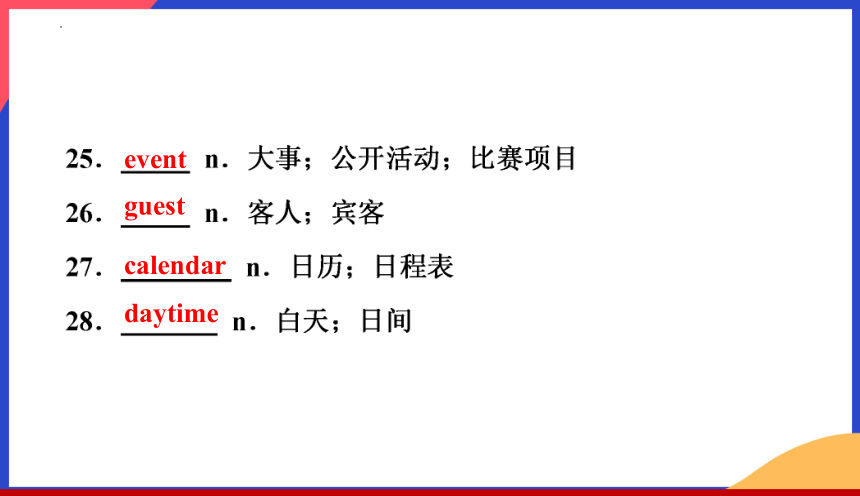
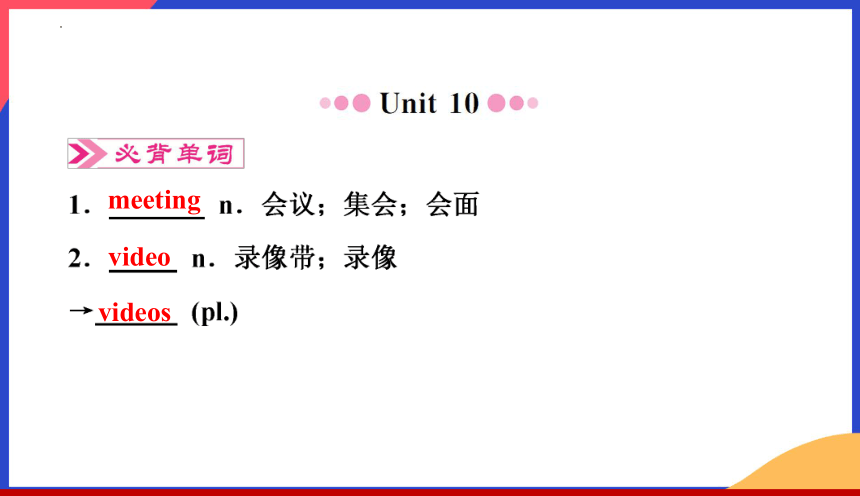

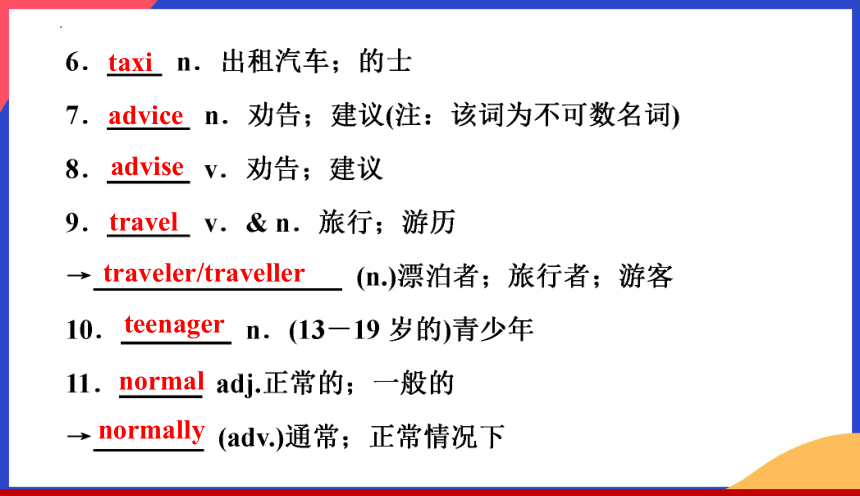

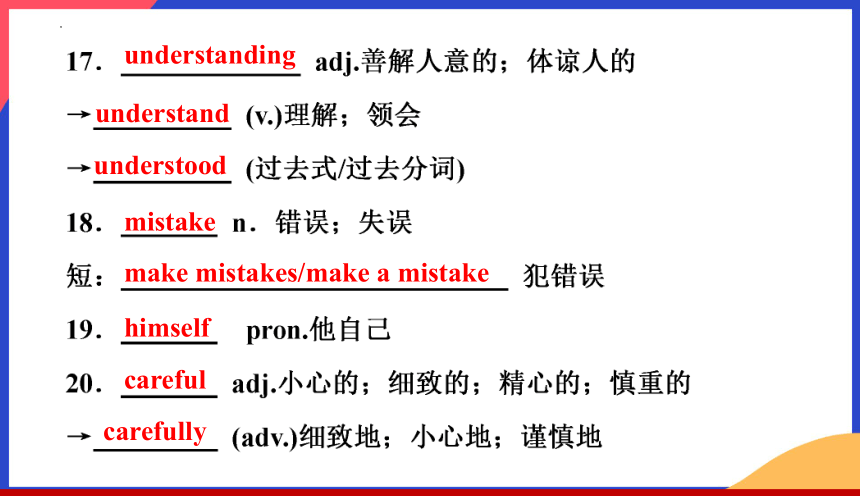
文档简介
(共116张PPT)
Units 9~10
过词汇 过短语
过句型 过语法 过核心考点 备考跟踪练习
2024年一轮复习,分册复习一--过教材
人教版八年级上册
preparation
exam/examination
flu
available
until
hang
hung
hang out
catch
caught
catch up with
invite
invite sb.to do sth.
invitation
accept
refuse
weekday
reply
forward
look forward to
delete
print
printer
sad
sadly
sadness
goodbye
glad
glue
without
surprised
surprising
opening
concert
event
guest
calendar
daytime
meeting
video
videos
organize/organise
organization
chocolate
upset
taxi
advice
advise
travel
traveler/traveller
teenager
normal
normally
unless
certainly
wallet
mile
angry
angrily
anger
be angry with sb.
understanding
understand
understood
mistake
make mistakes/make a mistake
himself
careful
carefully
careless
carelessly
solve
step
trust
experience
else
词汇拓展
experienced
preparation
hung/hanged
caught
invitation
opening
understood
understanding
1. experience (n.) →_____________ (adj.) 熟练的;老练的;富有经验的
2. prepare (v.) →____________ (n.) 准备;准备工作
3. hang (v.) →_____________ (过去式/过去分词) 悬挂;垂下
4. catch (v.) →________ (过去式/过去分词) 及时赶上;抓住;接住
5. invite (v.) →___________ (n.) 邀请;请帖;邀请函
6. open (v.) →__________ (n.) 开幕式;落成典礼
7. understand (v.) →____________ (过去式/过去分词) 理解;领会→
______________ (adj.) 善解人意;体谅人的
careful
careless
8. care (v.) →_________ (adj.) 小心的;细致的;精心的;慎重的→_________ (adj.) 粗心的;不小心的
refuse
9. accept (v.) →________ (反义词) 拒绝
solution
10. solve (v.) →__________ (n.) 解答方案;解决办法
sadly
sadness
11. sad (adj.) →_______ (adv.) 悲哀地;忧愁地→_________ (n.) 悲伤;悲痛
certainly
12. certain (adj.) →__________ (adv.) 无疑;肯定;当然;行
angrily
13. angry (adj.) →_________ (adv.) 生气地;发怒地
surprised
14. surprise (n. & v.) →__________ (adj.) 惊奇的;感觉意外的→___________ (adj.) 令人吃惊的
surprising
travelled/traveled
traveller/traveler
15. travel (n. & v.) →_________________ (过去式/过去分词)→
________________ (n.) 游客;旅行者;漂泊者
B
A
C
A
C
D
B
D
C
A
B
B
A
5. turn down
熟义:拒绝
生义:
A. 把……调低;关小 B. 减少;降低
I'm afraid his radio is too noisy. Will you please ask him to turn it down a little?________
A
1. __________________ 接受邀请
2. _________________ (= ten more minutes)
另外10分钟
3. _________________ 其他时间;别的时间
4. _________________ 一片 / 条(……)
5. _________________ 在……末尾
6. ______________________
完成或做了事情的一部分
accept an invitation
another ten minutes
another time
a piece of
at the end of
be halfway to doing sth.
7. _____________________ 用……覆盖……
8. _____________________ 把……切成片 / 切碎
9. _____________________ 切碎
10. ____________________ 感觉更糟
11. ____________________ 用……填满……
12. ____________________ 从某人处得到建议
13. ____________________ 接受教育
14. ____________________ 和某人打架
15. ____________________ 给某人提建议
16. ____________________ 骑自行车
cover ... with
cut ... into pieces
cut up
feel worse
fill ... with
get advice from sb.
get an education
get into a fight with sb.
give sb. advice
go bike riding
17. ____________________ 去看医生
18. ____________________ 闲逛;常去某处
19. ____________________ 在……方面有问题
20. ____________________ 患流感
21. ____________________ 收到(某人的)信、电话等
22. ____________________ 帮助分担工作、解决难题
23. ____________________ 分成两半
24. ____________________ 最后
25. ____________________ 邀请某人参加……;
邀请某人到……
go to the / a doctor
hang out
have the flu
hear from
help out
in half
in the end
invite sb. to ...
have problems with ...
26. __________________ 邀请某人做某事
27. __________________ 保守秘密
28. __________________ 照料;照顾
29. __________________ 盼望;期待
30. __________________ 赚很多钱
31. __________________ 发出邀请
32. __________________ 犯错
33. __________________ 逐一地
34. __________________ 炸土豆片;炸薯条
35. __________________ 把……倒进……
invite sb. to do sth.
keep ... to oneself
look after
look forward to doing
make a lot of money
make mistakes
one by one
pour ... into ...
make an invitation
potato chips
36. ____________________ 为……做准备
37. ____________________ 以书面的形式进行回复
38. ____________________ 把……放进……
39. ____________________ 躲开;回避
40. ____________________ 去旅行
41. ____________________ 从……带出 / 取出……
42. ____________________ 后天
43. _____________________ 前天
44. ____________________ 周游世界
run away from
take a trip
take out ... from ...
the day after tomorrow
the day before yesterday
travel around the world
prepare for ...
put ... into ...
reply in writing
45. __________________ 拒绝
46. __________________ 接通;打开
47. __________________ 担心某人
48. __________________________
我们新图书馆的落成典礼
the opening of our new library
worry about sb.
turn on
turn down
重点句型
1. —Can you come to my party on Saturday 周六你能来参加我的聚会吗
一Sure, _____ ___________.当然了,我很乐意。
I'd
love
to
another
time
2. That's too bad. Maybe_______________. 太糟糕了,也许下一次吧。
isn't
until
3. Oh, but Sam ______leaving _______next Wednesday.
哦,但是萨姆直到下周三才离开。
What's
today
4. — _________ ________ 今天是什么日子
一-It's Monday the 14th. 今天是14号,星期一。
What
will
if
6.____________happen ____ they have the partytoday 如果他们今天聚会将会发生什么事
I'll
never
7. But if I go to college, ____________become agreat soccerplayer.但是如果我上大学,就永远不可能成为一- 名伟大的足球运动员。
keep
them
to
themselves
8. If people have problems , they should ____________________________. 如果人们遇到问题,他们应该保守秘密。
have
a
great
time
5. If you go to the party , you'll ______________________!
如果你去参加宴会,你会玩得很开心!
Unless
certainly
stay
out
worry
about
9._________we talk to someone,we'll __________feel worse.如果我们不和人倾诉,必然会感到更难过。
10. If the teenagers ___________too late, their parents will _______________them.如果青少年在外面待到太晚,他们的父母会担心他们。
核心语法
1.情态动词can,must和haveto的用法(见P141)
2. if引导的条件状语从句(见P133)
考点透视
1. add v. 增加;添加
常用结构:
add... to... 把……添加到……上/里
add to 增加
add up (把……)加起来
add up to 总共是,总计为
【语境应用】根据汉语意思完成英语句子,每空一词。
1) 我妈妈在汤里又加了两勺盐。
My mother _______ two more spoons of salt _______ the soup.
2) 这汤有点稠,我需要加点水吗?
The soup is a little thick. Do I need to ________ ________ ________
added to
add some water
2. prepare v. 使做好准备;把……准备好
prepare for 为……做准备
prepare to do sth. 准备做某事
prepare sth. for… 为……准备某物
prepare sb. for sth. 使某人为某事做准备
preparation n. 准备;准备工作
make preparations for sth. 为某事做准备
1) Science is my favourite subject, so I have prepared ________ the STEAM Club.
A. join B. joining C. to join D. to joining
(2023江苏扬州中考)
2) 用括号中所给单词的适当形式完成句子(每空仅限1个单词)
To many Chinese people, the process of _________ the Spring Festival dinner together is more important than the dinner itself. (prepare)
(2023内蒙古包头中考)
preparing
C
3) —Helen, why didn't you come to the party yesterday
— Oh, I___________ for the speech competition.
A. prepares B. prepared C. will prepare
(2022吉林中考)
4) —You look pretty busy. What’s up
—We ________ for an office party this Friday evening. There will be about thirty people, and I am the organizer.
A. prepare B. have prepared
C. are preparing D. were preparing (2022内蒙古包头中考)
B
C
3. mix v. (使)混合;融合 n. 混合配料
既可作及物动词,也可作不及物动词。
当它作及物动词时,常用结构有:
① mix A and B (together) / mix A with B 把A和B相混合
② mix A into B 将A加进B中混匀
③ mix sth. up 弄错;弄乱; 混合
【语境应用】完成句子。
1) 油和水不相融。
Oil and water _______ _______.
2) 这两个单词相似。别把它们弄混了。
These two words are similar. Don't _______ _______ _______.
3) 把这些鸡蛋和在面粉里。
_______ these eggs __________ the flour.
4) 她把黄油和糖混在了一起。
She _______ the butter _______ sugar together.
don't mix
mix them up
Mix into / with
mixed and
4. fill v. (使)充满;装满
常用结构:fill ... with ... 用……装满……
be filled with ... 装满充满
【拓展】
be full of ... 充满……,可与be filled with ...互换使用
filled adj. 装满的;充满的
【语境应用】完成句子。
1) 她往包里装满了各种各样的食物。
She _______ the bag _______ all kinds of food.
2) 生活充满了惊喜。
Life _____________________ surprises.
filled with
is filled with / is full of
根据所给中文意思完成句子, 每空一词。(2023内蒙古通辽中考)
你为别人倒茶时,要倒七分满。
When you serve the tea to somebody, you should ________ the cup 70% full _________ the tea.
fill
with
5. cover v. 覆盖;遮盖 n. 遮盖物;被子;封面
cover sb./sth. with... 用……把某人/某物盖上 (动作)
be covered with … ……被……盖着(状态)
discover v. (偶然的)发现,发掘
uncover v. 发现,破获,揭露
【语境应用】完成句子。
1) 我没有带伞,所以下雨的时候我就用报纸遮头。
I didn’t take my umbrella so I ________ my head ______ a newspaper when it rained.
2) 几年前,大卫曾登上《时代》周刊的封面。
A few years ago, David ______________ of Time magazine.
covered
with
was on the cover
6. serve v. 提供服务;接待
serve sth. to sb.= serve sb. sth. 给某人提供某物
serve as 充当;做……之用
serve the people 为人民服务
service n. 接待;服务
【语境应用】翻译句子。
1) 服务员把汤端了上来。
The waiter served the soup.
2) 她的公寓也作她的办公室用。
Her apartment also serves as her office.
3) 服务生给Green先生上了一杯茶。
The waiter served a cup of tea to Mr. Green.
4) 我们的目标是以最低的价格提供最好的服务。
Our aim is to provide the best service at the lowest price.
7. until prep. / conj. 到……时;直到……为止
【归纳】
① 肯定句中,“一直到……时(为止)”或“在……之前”,句中的动词为持续性动词。如:
He studied until midnight last night / his father came back.
② 否定句中,not…until… “直到……才……”。如:
Linda didn’t go to bed until ten last Monday evening / her sister turned off the TV.
【语境应用】完成句子。
1) 他们昨晚直到十一点才上床睡觉。
They __________________________ 11 o'clock last night.
2) 天黑之前Sam不会回来。
Sam __________________________ it is dark.
3) Tina昨天一直睡到上午九点。
Tina ________________________ yesterday.
didn't go to bed until / before
won't come back before / until
slept until 9:00 a.m.
1) Let’s wait ________ the rain stops.
A. so B. while C. since D. until
(2023甘肃武威中考)
2) It's raining too hard outside. We won't leave ________ the rain stops.
A. if B. after C. when D. until
(2023辽宁本溪、葫芦岛中考)
D
D
3) —Peter, how long have you been in the ice skating club
—Not long. I didn’t join the club _______ I enjoyed the 2022 Beijing Winter Olympic Games.
A. when B. until C. unless D. after
(2022四川泸州中考)
4) Before you get off the bus, you should wait ________it has stopped.
A. until B. but C. because D. so
(2022天津中考)
B
A
8. hang v. 悬挂;垂下,其过去式和过去分词均为hung。
绞死,其过去式和过去分词均为hanged。
常用搭配:
hang on =hold on 稍等;别挂电话
hang out 闲逛
【语境应用】根据所给汉语意思完成英语句子。
1) 他把他的外套挂在了门后的钩子上。
He ___________ his coat on a hook behind the door.
2) 请别挂断电话,格林先生马上来。
Please ________________. Mr. Green will come right away.
3) 他被捕后不久就被处以绞刑。
He ________________ soon after he was caught.
4) 我的祖父母通常在晚饭后闲逛。
My grandparents usually _____________ after dinner.
hung
hold / hang on
was hanged
hang out
9. catch v.
① 及时赶上(车、船、飞机等)
catch the bus / train / plane (赶上公共汽车 / 火车 / 飞机)
② 接住;抓住(某物)
③ 逮住(人);捕获(动物)
④ 患病,catch a cold 感冒
⑤ 理解;听清,catch one's words 听懂 / 听清某人的话
⑥ 着(火),catch fire 着火
【语境应用】完成句子。
1) 我伸出一只手,接住了球。
I reached out a hand and _______________.
2) 猫捉老鼠。
Cats _______________.
3) 请说慢点。我不明白你的意思。
Please speak slowly. I didn't _________________________
____________.
4) 我们匆匆吃了一顿饭,然后跑着去赶火车。
We had a quick meal and then ran to _______________.
caught the ball
catch mice
catch your meaning / what you said
catch the train
10. invite v. 邀请
invite sb. to/for ... 邀请某人参加……
invite sb. to do sth. 邀请某人做某事
invite sb. to some place 邀请某人到某处
invitation n.
make an invitation 发出邀请
accept an invitation 接受邀请
turn down/refuse an invitation 拒绝邀请
1) —Our school will invite Mr. Wang ________ us a talk on
environmental protection next week.
—That's wonderful!
A. give B. to give C. giving D. gave
(2023江苏宿迁中考)
2) —Will Mr. Li come to the party!
—Yes. He_________ my invitation happily.
A. reached B. accepted C. achieved D. expressed
(2023辽宁本溪、葫芦岛中考)
B
B
11. accept v. 接受
词汇 含义 不同
receive 收到 强调客观上接到或收到,收到具体的东西:信件、礼物等,常与from连用。
accept 接受 强调主观上接受,接受抽象的东西:想法、表扬、批评、道歉等。
receive, accept
【语境应用】用accept或receive的恰当形式完成句子。
1) With all her efforts, the children finally _________ her as one of the family.
2) Yesterday, Jack ________ an invitation from Mark and ________ it happily.
accepted
received
accepted
12. refuse v. 拒绝
常用结构:refuse to do sth. 拒绝做某事
【链接】
turn down:拒绝;调低;关小
其反义词组是turn up。如果其宾语为名词(短语),该名词(短语)可置于turn down / up后面或turn与down / up之间;如果其宾语为代词,该代词应置于turn与down / up之间。
【语境应用】
Ⅰ. 词汇运用。
1) Don't refuse _______(share) your ideas with your parents.
2) They _______(refuse) my invitation. It made me upset.
Ⅱ. 完成句子。
1) 这是个好计划。没有理由拒绝它。
It's a great plan. There is no reason to ______ ______ ______.
2) 这个工作机会太好了,无法拒绝。
The job offer was _______ _______ _______ _______.
to share
refused
turn it down
too good to refuse
13. reply v. & n. 回答;答复
①作动词时,有两种用法:
作不及物动词,后接宾语时,需借助介词to
作及物动词,一般接that从句等
②作名词时,其后跟介词to,表示“对……的答复”。
常见搭配有:
get / have / receive a reply (to ...) 收到(对……的)答复
give / make a reply (to ...) (对……)进行回复
wait for / expect one's reply等待/期待某人的答复
【语境应用】完成句子。
1) 我不确定该如何回答这个问题。
I wasn't sure how to ____________________________.
2) 你会在七天内收到答复。
You will _________________________ within seven days.
3) Henry回复说他下周六没空。
Henry ______________ he was not available next Saturday.
4) Emma正在等你的答复。
Emma is ____________________________.
reply to this / the question
get / have / receive a reply
replied that
waiting for your reply
14. advise v. 劝告;建议
advise sb. about/on sth. 就某事向某人提建议
advise sb. (not) to do sth. 建议某人(不)做某事
advise doing sth. 建议做某事
advice n. [U]劝告;建议
give sb. advice 给某人建议
take one’s advice 接受某人的建议
follow one’s advice 遵循某人的建议
如果表示“一条建议;一则忠告”,常用a piece of advice。
1) —Can you give me some ________ on learning English
well
—Sure. Watching English programs is a good way.
A. news B. advice C. decisions D. messages
(2023湖北孝感中考)
2) —Does the colour red represent good things in Chinese culture
—Yes. But writing one’s name in red is not good, and we usually ________ it.
A. avoid B. advise C. allow D. accept
(2022江苏无锡中考)
A
B
3) The local government advises people ______ to other places ______ it is not necessary during the pandemic.
A. travel; unless B. to not travel; if
C. not to travel; unless D. not to travel; if
(2022四川达州中考)
4) —Miss Li, can you tell me how to improve my writing skills
—Certainly. I advise you _____ a diary in English every day.
A. to keep B. keeping C. kept D. keep
(2022 江苏宿迁中考)
D
A
15. travel v.
①旅行;游历
常用于短语: travel (around) the world 环游世界
travel to ... 去……旅行
②以某速度、朝某方向或在某距离内)行进,传播
n. 旅行;游历。泛指一切旅游。
【链接】
trip n. 旅行,指往返的旅行,尤指娱乐性的短途旅行。
常用短语:go on / take a trip
【语境应用】完成句子。
1) 她每天走两英里去上班。
She ______________________ to work each day.
2) 光比声音传播得快。
Light ______________________ than sound.
3) 我们计划今年夏天去杭州旅游。
We are planning to ______________________________ Hangzhou this summer.
travels / walks two miles
travels faster
travel / go on a trip / take a trip to
16. mistake
n. 错误;失误;可数名词
make a mistakes 犯错
make a mistake/mistakes in sth. 在某方面犯错
by mistake 错误地
v. 弄错,误解,误会
mistake sb. / sth. for sb. / sth. 把……错当成
【语境应用】按要求完成各题。
My brother was quite careless, so he _______ in spelling in the exam. (2021黑龙江龙东)
made mistakes B. made decisions
C. made plans
2) 抱歉,我错拿了你的雨伞。
Sorry, I took your umbrella ______ _______.
A
by mistake
17. careful adj. 小心的;细致的;精心的;慎重的
常用结构有:
① be careful of / about / with sth. 当心 / 注意某物
② be careful to do sth. 当心 / 留神做某事
【链接】
① careful的反义词是careless, 粗心的;不小心的。
② careful是由care加后缀-ful构成的形容词。
【语境应用】选词填空。
careful, careless, care
1) Be _______ not to wake the baby.
2) It was _______ of you to lose my keys.
3) She really _______ about the environment.
4) Peter is very _______ with his money. He doesn't spend it on unimportant things.
careful
careless
cares
careful
18. experience n.
①经验,用作不可数名词
常用于短语: have (no) experience in / of ... 在……方面(没)有经验
② 经历,用作可数名词。
v. 经历;体验
【拓展】
experienced adj. 有经验的;老练的
【语境应用】完成句子。
1) 他有丰富的英语教学经验。
He _______ _______ ___________ _______ teaching English.
2) 我有很多有趣的经历要和你分享。
I have _____ ____ __________ __________ to share with you.
3) 孩子们需要自己经历事情才能从中学习。
Children need _______ __________ _______ for themselves so that they can learn from them.
4) 她是一位经验丰富的女演员。
She is _______ ___________ _______.
has much experience in / of
lots of interesting experiences
to experience things
an experienced actress
辨析 含义 例句
turn on 打开 I want to watch TV. May I turn it on
turn off 关上 You should turn off the light when you go to bed.
turn up (音量)开大; 出现 Do you mind if I turn up the music
turn down (音量)调小;拒绝 Do you mind if I turn down the music
1. turn on, turn off, turn up, turn down
1) It’s a good habit to ______ the lights when you leave a room.
A. turn down B. tum up
C. turn off D. turn on
(2023云南中考)
根据所给汉语提示完成句子,每空一词。
2) 你离开房间时必须关灯。
You must __________ __________ the lights when you leave a room.
(2023湖北随州中考)
C
turn off
3) —Julie, why did you _______ the job
—Because I found a better one.
A. turn up B. turn down C. look for D. look through
(2022 广西贵港中考)
4) Remember __________the light when you leave the classroom.
A. turn off B. to turn off C. turning off
(2022湖南郴州中考)
B
B
5) It is too dark. Why don’t you ______ the light
A. put on B. get on C. turn on D. keep on
(2022湖北十堰中考)
6) Please ________ the lights when you leave the room. Be a greener person.
A. turn off B. turn on C. turn up
(2022福建中考)
C
A
词汇 释义+用法 例句
hear from sb. 收到……的来信 I heard from my father last week.
hear of sb./sth. 听说 I’ve never heard of the place.
hear about sth. 听到关于……的消息 I’ve just heard about his promotion.
2. hear from, hear of, hear about
完成句子、同义辨析。
你是如何知道我们的产品的? (hear of)
______________________________________
How did you hear of our product
2) Ms. Ling got a letter from her pen friend yesterday. (2020贵州黔东南)
A. wrote to B. heard from
C. waited for D. heard of
B
3. cut up 切碎
cut ... into pieces 将……切成片
cut down 砍倒;减少
cut in 插嘴
cut off 切断,中断
cut out 裁剪,删除
cut through 抄近路,穿过
1) Let’s ______ the chicken and make some soup.
A. look at B. cut up C. put off D. knock against
(2022甘肃武威、天水中考)
2) — Tina, I want to make some soup. Can you ________ some tomatoes for me
— Sure, no problem.
A. make up B. fix up C. put up D. cut up
(2022四川广元中考)
B
D
1. Can you come to my party
Can you... 你能……吗?
客气地请求某人做某事。
接受邀请 I would (I’d) love to.或Certainly…
不能接受邀请,Sorry, I can’t.或I’d love to, but...。
用could比can语气委婉,有礼貌,用can则较随意。
邀请、请求或征求意见的常用表达:
Can/Could you... Would you like to...
What/How about... Shall (we)… May I invite you to...
【链接】
接受邀请时:
Yes, I’d love to./ I’d like to.
Yes. It’s very nice/kind of you.
That sounds great.
I’m happy (glad) to...
委婉拒绝时:
I’d love/like to, but...
Maybe another time.
I’m sorry I can’t. I have to...
I’m afraid I can’t. / not.
2. Hope you can make it!
希望你能参加聚会!
make it的用法 例句
准时到达(尤指困难情况下) If we hurry, we can still make it home before dark.
表示约定时间 —shall we meet next week
—OK. Let’s make it next Monday.
表示达到预定目标 He never really made it as an actor.
他从来不是一个真正的演员。
1) — I'm afraid I can't pass the driving test tomorrow.
—_____! I'm sure you'll make it. (2021辽宁丹东)
A. Glad to hear that B. Congratulations
C. Sounds great D. Cheer up
2) I thought he would be too old to get to the top of the mountain, but he _______ at last.
A. got it B. took it C. enjoyed it D. made it
D
D
可数名词
(1)可数名词一般有单数和复数两种形式,名词复数形式不规则变化的如:
a. child→ children, tooth→ teeth,
mouse→ mice, foot→ feet,
man→ men, woman→ women
b. 单复数同形的如:Chinese, sheep, fish
(注意:表示不同种类的鱼用fishes)
(2) 基数词或者some, many等词可直接修饰可数名词,表示数量。如:
two apples, many books
(3) 对可数名词的数量进行提问时用how many。(注意:how many后接可数名词的复数形式)
不可数名词
(1) 不可数名词没有单、复数形式的变化。若要表示不可数名词的量,通常可用相应的单位词,复数形式常体现在单位词上。如:
a piece of meat / paper / cake / advice / news, a bowl of rice, three glasses of water
(2) 对不可数名词的量进行提问时用how much。
既可数又不可数的名词
这类名词须在句中根据语法及句意判断是可数还是不可数。如:
chicken, salad, ice-cream, cabbage, cake, fruit, experience
1. —How much ________ do you need
—We need two cups.
A. milk B. egg C. pear D. potato
(2022广西贺州中考)
2. — Would you like some______
—Yes, madam.
A. egg B. juice C. milk teas
(2022湖南邵阳中考)
A
B
情态动词表示说话人对所说动作的观点,如需要、可能、意愿、怀疑等。情态动词本身虽有一定的意义,但不能单独作谓语动词,必须和不带to的动词原形连用,并且情态动词没有人称和数的变化(have to除外)。主要有can, could, may, might, must, have to, need, should, had better等。
can / could
1. “能;会”。can表示现在或将来的能力。
could为can的过去式,表示过去的能力。如:
Helen can play the piano.
2. “可以”。二者都可以表示请求、允许。用could比用can语气更加委婉和客气,答语用can。如:
—Could/Can you open the window for me
—Of course I can.
3. 表示“推测” 。
can’t “不可能”,表示有把握的推测。
could可能。可用于肯定句中表示不确定的推测。如:
It can’t be Bruce’s basketball. He only likes playing soccer.
Be careful. You could hurt yourself when you use knives.
may / might
1. may可以。表示请求、许可。当may表示请求时,用于主语为第一人称的一般疑问句中,肯定回答常用may,否定回答常用can’t。如:
—May I use your mobile phone
—Yes, you may. / No, you can’t.
2. may和might可能;也许。都可以表示推测。might语气不确定,表示的可能性更小。如:
Ella may/might have the book you’re looking for.
must / have to
1. 1) must必须。表示义务、命令或必要,强调主观看法,其否定式为mustn’t:不允许;禁止。
回答由must 引起的一般疑问句时,肯定回答用must,否定回答用needn’t或don’t have to:不必。如:
All passengers must wear seat belts.
—Must I take my shoes away now
—Yes, you must. / No, you needn’t / don’t have to.
2) must一定是/在。用于肯定句中,+be,很有把握的推测。如:
Your father has been working hard all day. He must be tired.
2. have to不得不。强调客观需要,有人称、数和时态的变化。如:
Bill has to do several jobs to support his family.
need
需要。作情态动词时,多用于否定句或疑问句中。
回答由need引起的一般疑问句时,肯定回答:must,否定回答:needn’t。如:
—Need I drive you home
—Yes, you must. / No, you needn’t.
should
应该。既可表义务或责任,也可表劝告或建议。
否定式:shouldn’t 不应该。 如:
We shouldn’t waste food.
had better
had better do sth. 最好做某事,
否定式:had better not do sth. 如:
You had better go to school by bus. It’s a little far.
1. —Jack, could you please help me take out the trash
—Sorry, ________, mom. I ________ my homework now.
A. couldn’t, am doing B. can’t, am doing
C. can’t, do
(2023四川达州中考)
2. —________ I join the volunteer program on weekends
— Of course you can.
A. Can B. Must C. Should
(2023湖南怀化中考)
B
A
3. Earthquakes can be very dangerous. We ________ learn to protect ourselves.
A. might B. should C. could D. would
(2023江苏连云港中考)
4. —Would you like to visit Tianjin University tomorrow
—Sorry, I’m afraid I ________, I’ll work as a volunteer in
my community.
A. can B. can’t C. must D. mustn’t
(2023天津中考)
B
B
5. —The paper cutting is pretty lively. Who made it
—It ________ be Mary. None of us except her is able to do it.
A. can B. must C. need D. might
(2023山东滨州中考)
6. —How beautiful the paper cutting is! Who made it
—It ________ be Linda. She’s the only one that can make
it in our class.
A. must B. would C. can D. could
(2023湖北孝感中考)
B
A
7. —________ people wear helmets (头盔) when riding
electric bicycles
—Yes. It’s a new rule.
A. Can B. Must C. May
(2023湖南郴州中考)
8. —You ________ take the subway to the airport, for I can
drive you there directly.
—That’s very kind of you.
A. can’t B. needn’t C. mustn’t D. shouldn’t
(2023湖北荆州中考)
B
B
含有if引导的条件状语从句的复合句
1. if 条件状语从句中,主句用一般将来时,从句用一般现在时表示将来。主将从现原则。
e.g. We will go to the park if it doesn’t rain tomorrow.
2. If you are ill, you must go to the doctor.
if 条件状语从句中,如果主句有must,can,may 等情态动词,从句用一般现在时。
e.g. You must stop if the traffic light is red.
e.g. Don’t wait for me if I am late.
3. Please call me if you come back.
if 条件状语从句中,主句是祈使句,从句用一般现在时表示将来。主祈从现原则。
含有unless引导的条件状语从句的复合句
1. unless具有否定意义,表示的是否定条件(“如果不”),可以把它看作是if ... not的同义表达。
e.g. I won't be able to help you unless you tell me your problems.
2. 和if引导的条件状语从句一样,unless引导的条件状语从句也常用一般现在时。
e.g. Unless he goes right now, he will be late.
1. —Are you going to see the panda Huahua at the Chengdu
Research Base tomorrow
—Sure. If I ________ the chance, perhaps I can’t see her
any longer this holiday.
A. miss B. missed C. will miss
(2023四川凉山中考)
2. I don’t know if it ________ sunny tomorrow. If it ________ sunny, I will go fishing.
A. will be; is B. is; will be C. will be; is going to be
(2023黑龙江绥化中考)
A
A
备考跟踪训练
一、单项选择。
1.(2021,安徽)—Have you ever heard “A thousand mile journey begins with the first ____”
—Yes, It’s a famous Chinese saying by Laozi.
A. class B. step C. break D. exam
B
2.—Miss Yang, are you ____ this afternoon I’d like to ask you some questions.
—Yes, I will wait for you in my office.
A. afraid B. available C. absent D. active
B
3.—I offered Sandy a helping hand. However, she just ____ it.
—Maybe she can manage herself.
A. received B. returned C. refused D. rewarded
C
B
4.Ms. Ling got a letter from her pen friend yesterday.____
A. wrote to B. heard from C. waited for D. heard of
5.—Fangfang, shall we go to see a film on Saturday
—Sorry, I’ll have to ____ my younger brother because my mother is out.
A. look at B. look for C. look up D. look after
D
D
6.Wang Lei is looking forward to ____ the best high school in September.
A. refusing B. playing C. reading D. entering
7.—Do you know the traffic rules
—Sure, one of them is that we can’t go across the street ____ the light is green.
A. until B. after C. if D. but
A
B
8.Father is too tired today. Don’t call him ____ it is necessary.
A. if B. unless C. when D. whether
B
9.—Good morning, Lily. ____
—Thursday. It’s the Dragon Boat Festival.
A. How’s everything today B. What day is it today
C. How’s the weather today D. What’s the date today
10.—My English is poor. Could you help me with it
—____.
A. Thank you B. Me,too C. No problem D. See you
C
核心词汇自主测
单词填空
1. Chinese people often warmly treat their g________ with tea, such as Longjing or Puer.
2. As we all know, the first s________ to success is to believe in yourself.
3. No matter what problems you have, you shouldn't give up. Nobody e________ can beat you.
4. The students managed to s________ the problem by themselves, and their teachers were proud of them.
uests
tep
lse
olve
5. Jenny r________ to go on a picnic with me because she had to practice playing the piano.
6. Sometimes, getting a________ can't make a difference and it even makes the situation worse, so we should stay calm.
7. I have two tickets for the ________ /'k ns t/. You can take one
of them.
efused
ngry
concert
语法填空
A. 小题夯基
1. Don't be afraid of making _________(mistake). Learning from them is more important.
2. If you can't go to Linda's party, you should turn down her __________(invite) politely.
3. Teachers should let students think the problem __________(careful) before telling them the right answer.
mistakes
invitation
carefully
4. Jennifer cried ________(sad) for she was deeply moved by the movie.
5. Twenty foreign students took ________ trip to the countryside. They felt excited.(盲填)
6. The boy cut the apple________ half, one for his sister, and the other for himself.(盲填)
sadly
a
into
B. 语篇提能
(外文素材选自READING Triumphs G4)
如何选择公园?
Trish and Phil are good friends. Phil enjoys 1. __________(travel) as a visitor. He has visited many places. A few days ago, he wanted to have a special trip, so he asked Trish to help him plan this trip. Trish was glad 2. _________(accept) the request. Phil loves plants and animals. Therefore, Trish 3. ________(advise) him to go to the national park! It's only several 4. ________(mile) away from Phil's home.
travelling
to accept
advised
miles
There, Phil can have a 5. _________(wonder) experience of seeing different things. He can visit parks in the west with big canyons(峡谷). On 6. ________ other hand, Phil can visit parks with ponds. For the first time Phil will see thousands of frogs 7. ________(jump) here and there. Maybe he can catch one then play 8. ________ talk with it for a while. He should remember to send it back to where it belongs. He can take a boat in the river.
wonderful
the
jumping
and
A park 9.__________ has water and sand is a beach. Phil can swim at a beach. Then he can also fish and rest in the sun.
When Phil picks a park, he must pack his things. He 10. __________(certain) needs to bring a lot of things for his trip, such as a tent, a map and so on.
certainly
that/which
Units 9~10
过词汇 过短语
过句型 过语法 过核心考点 备考跟踪练习
2024年一轮复习,分册复习一--过教材
人教版八年级上册
preparation
exam/examination
flu
available
until
hang
hung
hang out
catch
caught
catch up with
invite
invite sb.to do sth.
invitation
accept
refuse
weekday
reply
forward
look forward to
delete
printer
sad
sadly
sadness
goodbye
glad
glue
without
surprised
surprising
opening
concert
event
guest
calendar
daytime
meeting
video
videos
organize/organise
organization
chocolate
upset
taxi
advice
advise
travel
traveler/traveller
teenager
normal
normally
unless
certainly
wallet
mile
angry
angrily
anger
be angry with sb.
understanding
understand
understood
mistake
make mistakes/make a mistake
himself
careful
carefully
careless
carelessly
solve
step
trust
experience
else
词汇拓展
experienced
preparation
hung/hanged
caught
invitation
opening
understood
understanding
1. experience (n.) →_____________ (adj.) 熟练的;老练的;富有经验的
2. prepare (v.) →____________ (n.) 准备;准备工作
3. hang (v.) →_____________ (过去式/过去分词) 悬挂;垂下
4. catch (v.) →________ (过去式/过去分词) 及时赶上;抓住;接住
5. invite (v.) →___________ (n.) 邀请;请帖;邀请函
6. open (v.) →__________ (n.) 开幕式;落成典礼
7. understand (v.) →____________ (过去式/过去分词) 理解;领会→
______________ (adj.) 善解人意;体谅人的
careful
careless
8. care (v.) →_________ (adj.) 小心的;细致的;精心的;慎重的→_________ (adj.) 粗心的;不小心的
refuse
9. accept (v.) →________ (反义词) 拒绝
solution
10. solve (v.) →__________ (n.) 解答方案;解决办法
sadly
sadness
11. sad (adj.) →_______ (adv.) 悲哀地;忧愁地→_________ (n.) 悲伤;悲痛
certainly
12. certain (adj.) →__________ (adv.) 无疑;肯定;当然;行
angrily
13. angry (adj.) →_________ (adv.) 生气地;发怒地
surprised
14. surprise (n. & v.) →__________ (adj.) 惊奇的;感觉意外的→___________ (adj.) 令人吃惊的
surprising
travelled/traveled
traveller/traveler
15. travel (n. & v.) →_________________ (过去式/过去分词)→
________________ (n.) 游客;旅行者;漂泊者
B
A
C
A
C
D
B
D
C
A
B
B
A
5. turn down
熟义:拒绝
生义:
A. 把……调低;关小 B. 减少;降低
I'm afraid his radio is too noisy. Will you please ask him to turn it down a little?________
A
1. __________________ 接受邀请
2. _________________ (= ten more minutes)
另外10分钟
3. _________________ 其他时间;别的时间
4. _________________ 一片 / 条(……)
5. _________________ 在……末尾
6. ______________________
完成或做了事情的一部分
accept an invitation
another ten minutes
another time
a piece of
at the end of
be halfway to doing sth.
7. _____________________ 用……覆盖……
8. _____________________ 把……切成片 / 切碎
9. _____________________ 切碎
10. ____________________ 感觉更糟
11. ____________________ 用……填满……
12. ____________________ 从某人处得到建议
13. ____________________ 接受教育
14. ____________________ 和某人打架
15. ____________________ 给某人提建议
16. ____________________ 骑自行车
cover ... with
cut ... into pieces
cut up
feel worse
fill ... with
get advice from sb.
get an education
get into a fight with sb.
give sb. advice
go bike riding
17. ____________________ 去看医生
18. ____________________ 闲逛;常去某处
19. ____________________ 在……方面有问题
20. ____________________ 患流感
21. ____________________ 收到(某人的)信、电话等
22. ____________________ 帮助分担工作、解决难题
23. ____________________ 分成两半
24. ____________________ 最后
25. ____________________ 邀请某人参加……;
邀请某人到……
go to the / a doctor
hang out
have the flu
hear from
help out
in half
in the end
invite sb. to ...
have problems with ...
26. __________________ 邀请某人做某事
27. __________________ 保守秘密
28. __________________ 照料;照顾
29. __________________ 盼望;期待
30. __________________ 赚很多钱
31. __________________ 发出邀请
32. __________________ 犯错
33. __________________ 逐一地
34. __________________ 炸土豆片;炸薯条
35. __________________ 把……倒进……
invite sb. to do sth.
keep ... to oneself
look after
look forward to doing
make a lot of money
make mistakes
one by one
pour ... into ...
make an invitation
potato chips
36. ____________________ 为……做准备
37. ____________________ 以书面的形式进行回复
38. ____________________ 把……放进……
39. ____________________ 躲开;回避
40. ____________________ 去旅行
41. ____________________ 从……带出 / 取出……
42. ____________________ 后天
43. _____________________ 前天
44. ____________________ 周游世界
run away from
take a trip
take out ... from ...
the day after tomorrow
the day before yesterday
travel around the world
prepare for ...
put ... into ...
reply in writing
45. __________________ 拒绝
46. __________________ 接通;打开
47. __________________ 担心某人
48. __________________________
我们新图书馆的落成典礼
the opening of our new library
worry about sb.
turn on
turn down
重点句型
1. —Can you come to my party on Saturday 周六你能来参加我的聚会吗
一Sure, _____ ___________.当然了,我很乐意。
I'd
love
to
another
time
2. That's too bad. Maybe_______________. 太糟糕了,也许下一次吧。
isn't
until
3. Oh, but Sam ______leaving _______next Wednesday.
哦,但是萨姆直到下周三才离开。
What's
today
4. — _________ ________ 今天是什么日子
一-It's Monday the 14th. 今天是14号,星期一。
What
will
if
6.____________happen ____ they have the partytoday 如果他们今天聚会将会发生什么事
I'll
never
7. But if I go to college, ____________become agreat soccerplayer.但是如果我上大学,就永远不可能成为一- 名伟大的足球运动员。
keep
them
to
themselves
8. If people have problems , they should ____________________________. 如果人们遇到问题,他们应该保守秘密。
have
a
great
time
5. If you go to the party , you'll ______________________!
如果你去参加宴会,你会玩得很开心!
Unless
certainly
stay
out
worry
about
9._________we talk to someone,we'll __________feel worse.如果我们不和人倾诉,必然会感到更难过。
10. If the teenagers ___________too late, their parents will _______________them.如果青少年在外面待到太晚,他们的父母会担心他们。
核心语法
1.情态动词can,must和haveto的用法(见P141)
2. if引导的条件状语从句(见P133)
考点透视
1. add v. 增加;添加
常用结构:
add... to... 把……添加到……上/里
add to 增加
add up (把……)加起来
add up to 总共是,总计为
【语境应用】根据汉语意思完成英语句子,每空一词。
1) 我妈妈在汤里又加了两勺盐。
My mother _______ two more spoons of salt _______ the soup.
2) 这汤有点稠,我需要加点水吗?
The soup is a little thick. Do I need to ________ ________ ________
added to
add some water
2. prepare v. 使做好准备;把……准备好
prepare for 为……做准备
prepare to do sth. 准备做某事
prepare sth. for… 为……准备某物
prepare sb. for sth. 使某人为某事做准备
preparation n. 准备;准备工作
make preparations for sth. 为某事做准备
1) Science is my favourite subject, so I have prepared ________ the STEAM Club.
A. join B. joining C. to join D. to joining
(2023江苏扬州中考)
2) 用括号中所给单词的适当形式完成句子(每空仅限1个单词)
To many Chinese people, the process of _________ the Spring Festival dinner together is more important than the dinner itself. (prepare)
(2023内蒙古包头中考)
preparing
C
3) —Helen, why didn't you come to the party yesterday
— Oh, I___________ for the speech competition.
A. prepares B. prepared C. will prepare
(2022吉林中考)
4) —You look pretty busy. What’s up
—We ________ for an office party this Friday evening. There will be about thirty people, and I am the organizer.
A. prepare B. have prepared
C. are preparing D. were preparing (2022内蒙古包头中考)
B
C
3. mix v. (使)混合;融合 n. 混合配料
既可作及物动词,也可作不及物动词。
当它作及物动词时,常用结构有:
① mix A and B (together) / mix A with B 把A和B相混合
② mix A into B 将A加进B中混匀
③ mix sth. up 弄错;弄乱; 混合
【语境应用】完成句子。
1) 油和水不相融。
Oil and water _______ _______.
2) 这两个单词相似。别把它们弄混了。
These two words are similar. Don't _______ _______ _______.
3) 把这些鸡蛋和在面粉里。
_______ these eggs __________ the flour.
4) 她把黄油和糖混在了一起。
She _______ the butter _______ sugar together.
don't mix
mix them up
Mix into / with
mixed and
4. fill v. (使)充满;装满
常用结构:fill ... with ... 用……装满……
be filled with ... 装满充满
【拓展】
be full of ... 充满……,可与be filled with ...互换使用
filled adj. 装满的;充满的
【语境应用】完成句子。
1) 她往包里装满了各种各样的食物。
She _______ the bag _______ all kinds of food.
2) 生活充满了惊喜。
Life _____________________ surprises.
filled with
is filled with / is full of
根据所给中文意思完成句子, 每空一词。(2023内蒙古通辽中考)
你为别人倒茶时,要倒七分满。
When you serve the tea to somebody, you should ________ the cup 70% full _________ the tea.
fill
with
5. cover v. 覆盖;遮盖 n. 遮盖物;被子;封面
cover sb./sth. with... 用……把某人/某物盖上 (动作)
be covered with … ……被……盖着(状态)
discover v. (偶然的)发现,发掘
uncover v. 发现,破获,揭露
【语境应用】完成句子。
1) 我没有带伞,所以下雨的时候我就用报纸遮头。
I didn’t take my umbrella so I ________ my head ______ a newspaper when it rained.
2) 几年前,大卫曾登上《时代》周刊的封面。
A few years ago, David ______________ of Time magazine.
covered
with
was on the cover
6. serve v. 提供服务;接待
serve sth. to sb.= serve sb. sth. 给某人提供某物
serve as 充当;做……之用
serve the people 为人民服务
service n. 接待;服务
【语境应用】翻译句子。
1) 服务员把汤端了上来。
The waiter served the soup.
2) 她的公寓也作她的办公室用。
Her apartment also serves as her office.
3) 服务生给Green先生上了一杯茶。
The waiter served a cup of tea to Mr. Green.
4) 我们的目标是以最低的价格提供最好的服务。
Our aim is to provide the best service at the lowest price.
7. until prep. / conj. 到……时;直到……为止
【归纳】
① 肯定句中,“一直到……时(为止)”或“在……之前”,句中的动词为持续性动词。如:
He studied until midnight last night / his father came back.
② 否定句中,not…until… “直到……才……”。如:
Linda didn’t go to bed until ten last Monday evening / her sister turned off the TV.
【语境应用】完成句子。
1) 他们昨晚直到十一点才上床睡觉。
They __________________________ 11 o'clock last night.
2) 天黑之前Sam不会回来。
Sam __________________________ it is dark.
3) Tina昨天一直睡到上午九点。
Tina ________________________ yesterday.
didn't go to bed until / before
won't come back before / until
slept until 9:00 a.m.
1) Let’s wait ________ the rain stops.
A. so B. while C. since D. until
(2023甘肃武威中考)
2) It's raining too hard outside. We won't leave ________ the rain stops.
A. if B. after C. when D. until
(2023辽宁本溪、葫芦岛中考)
D
D
3) —Peter, how long have you been in the ice skating club
—Not long. I didn’t join the club _______ I enjoyed the 2022 Beijing Winter Olympic Games.
A. when B. until C. unless D. after
(2022四川泸州中考)
4) Before you get off the bus, you should wait ________it has stopped.
A. until B. but C. because D. so
(2022天津中考)
B
A
8. hang v. 悬挂;垂下,其过去式和过去分词均为hung。
绞死,其过去式和过去分词均为hanged。
常用搭配:
hang on =hold on 稍等;别挂电话
hang out 闲逛
【语境应用】根据所给汉语意思完成英语句子。
1) 他把他的外套挂在了门后的钩子上。
He ___________ his coat on a hook behind the door.
2) 请别挂断电话,格林先生马上来。
Please ________________. Mr. Green will come right away.
3) 他被捕后不久就被处以绞刑。
He ________________ soon after he was caught.
4) 我的祖父母通常在晚饭后闲逛。
My grandparents usually _____________ after dinner.
hung
hold / hang on
was hanged
hang out
9. catch v.
① 及时赶上(车、船、飞机等)
catch the bus / train / plane (赶上公共汽车 / 火车 / 飞机)
② 接住;抓住(某物)
③ 逮住(人);捕获(动物)
④ 患病,catch a cold 感冒
⑤ 理解;听清,catch one's words 听懂 / 听清某人的话
⑥ 着(火),catch fire 着火
【语境应用】完成句子。
1) 我伸出一只手,接住了球。
I reached out a hand and _______________.
2) 猫捉老鼠。
Cats _______________.
3) 请说慢点。我不明白你的意思。
Please speak slowly. I didn't _________________________
____________.
4) 我们匆匆吃了一顿饭,然后跑着去赶火车。
We had a quick meal and then ran to _______________.
caught the ball
catch mice
catch your meaning / what you said
catch the train
10. invite v. 邀请
invite sb. to/for ... 邀请某人参加……
invite sb. to do sth. 邀请某人做某事
invite sb. to some place 邀请某人到某处
invitation n.
make an invitation 发出邀请
accept an invitation 接受邀请
turn down/refuse an invitation 拒绝邀请
1) —Our school will invite Mr. Wang ________ us a talk on
environmental protection next week.
—That's wonderful!
A. give B. to give C. giving D. gave
(2023江苏宿迁中考)
2) —Will Mr. Li come to the party!
—Yes. He_________ my invitation happily.
A. reached B. accepted C. achieved D. expressed
(2023辽宁本溪、葫芦岛中考)
B
B
11. accept v. 接受
词汇 含义 不同
receive 收到 强调客观上接到或收到,收到具体的东西:信件、礼物等,常与from连用。
accept 接受 强调主观上接受,接受抽象的东西:想法、表扬、批评、道歉等。
receive, accept
【语境应用】用accept或receive的恰当形式完成句子。
1) With all her efforts, the children finally _________ her as one of the family.
2) Yesterday, Jack ________ an invitation from Mark and ________ it happily.
accepted
received
accepted
12. refuse v. 拒绝
常用结构:refuse to do sth. 拒绝做某事
【链接】
turn down:拒绝;调低;关小
其反义词组是turn up。如果其宾语为名词(短语),该名词(短语)可置于turn down / up后面或turn与down / up之间;如果其宾语为代词,该代词应置于turn与down / up之间。
【语境应用】
Ⅰ. 词汇运用。
1) Don't refuse _______(share) your ideas with your parents.
2) They _______(refuse) my invitation. It made me upset.
Ⅱ. 完成句子。
1) 这是个好计划。没有理由拒绝它。
It's a great plan. There is no reason to ______ ______ ______.
2) 这个工作机会太好了,无法拒绝。
The job offer was _______ _______ _______ _______.
to share
refused
turn it down
too good to refuse
13. reply v. & n. 回答;答复
①作动词时,有两种用法:
作不及物动词,后接宾语时,需借助介词to
作及物动词,一般接that从句等
②作名词时,其后跟介词to,表示“对……的答复”。
常见搭配有:
get / have / receive a reply (to ...) 收到(对……的)答复
give / make a reply (to ...) (对……)进行回复
wait for / expect one's reply等待/期待某人的答复
【语境应用】完成句子。
1) 我不确定该如何回答这个问题。
I wasn't sure how to ____________________________.
2) 你会在七天内收到答复。
You will _________________________ within seven days.
3) Henry回复说他下周六没空。
Henry ______________ he was not available next Saturday.
4) Emma正在等你的答复。
Emma is ____________________________.
reply to this / the question
get / have / receive a reply
replied that
waiting for your reply
14. advise v. 劝告;建议
advise sb. about/on sth. 就某事向某人提建议
advise sb. (not) to do sth. 建议某人(不)做某事
advise doing sth. 建议做某事
advice n. [U]劝告;建议
give sb. advice 给某人建议
take one’s advice 接受某人的建议
follow one’s advice 遵循某人的建议
如果表示“一条建议;一则忠告”,常用a piece of advice。
1) —Can you give me some ________ on learning English
well
—Sure. Watching English programs is a good way.
A. news B. advice C. decisions D. messages
(2023湖北孝感中考)
2) —Does the colour red represent good things in Chinese culture
—Yes. But writing one’s name in red is not good, and we usually ________ it.
A. avoid B. advise C. allow D. accept
(2022江苏无锡中考)
A
B
3) The local government advises people ______ to other places ______ it is not necessary during the pandemic.
A. travel; unless B. to not travel; if
C. not to travel; unless D. not to travel; if
(2022四川达州中考)
4) —Miss Li, can you tell me how to improve my writing skills
—Certainly. I advise you _____ a diary in English every day.
A. to keep B. keeping C. kept D. keep
(2022 江苏宿迁中考)
D
A
15. travel v.
①旅行;游历
常用于短语: travel (around) the world 环游世界
travel to ... 去……旅行
②以某速度、朝某方向或在某距离内)行进,传播
n. 旅行;游历。泛指一切旅游。
【链接】
trip n. 旅行,指往返的旅行,尤指娱乐性的短途旅行。
常用短语:go on / take a trip
【语境应用】完成句子。
1) 她每天走两英里去上班。
She ______________________ to work each day.
2) 光比声音传播得快。
Light ______________________ than sound.
3) 我们计划今年夏天去杭州旅游。
We are planning to ______________________________ Hangzhou this summer.
travels / walks two miles
travels faster
travel / go on a trip / take a trip to
16. mistake
n. 错误;失误;可数名词
make a mistakes 犯错
make a mistake/mistakes in sth. 在某方面犯错
by mistake 错误地
v. 弄错,误解,误会
mistake sb. / sth. for sb. / sth. 把……错当成
【语境应用】按要求完成各题。
My brother was quite careless, so he _______ in spelling in the exam. (2021黑龙江龙东)
made mistakes B. made decisions
C. made plans
2) 抱歉,我错拿了你的雨伞。
Sorry, I took your umbrella ______ _______.
A
by mistake
17. careful adj. 小心的;细致的;精心的;慎重的
常用结构有:
① be careful of / about / with sth. 当心 / 注意某物
② be careful to do sth. 当心 / 留神做某事
【链接】
① careful的反义词是careless, 粗心的;不小心的。
② careful是由care加后缀-ful构成的形容词。
【语境应用】选词填空。
careful, careless, care
1) Be _______ not to wake the baby.
2) It was _______ of you to lose my keys.
3) She really _______ about the environment.
4) Peter is very _______ with his money. He doesn't spend it on unimportant things.
careful
careless
cares
careful
18. experience n.
①经验,用作不可数名词
常用于短语: have (no) experience in / of ... 在……方面(没)有经验
② 经历,用作可数名词。
v. 经历;体验
【拓展】
experienced adj. 有经验的;老练的
【语境应用】完成句子。
1) 他有丰富的英语教学经验。
He _______ _______ ___________ _______ teaching English.
2) 我有很多有趣的经历要和你分享。
I have _____ ____ __________ __________ to share with you.
3) 孩子们需要自己经历事情才能从中学习。
Children need _______ __________ _______ for themselves so that they can learn from them.
4) 她是一位经验丰富的女演员。
She is _______ ___________ _______.
has much experience in / of
lots of interesting experiences
to experience things
an experienced actress
辨析 含义 例句
turn on 打开 I want to watch TV. May I turn it on
turn off 关上 You should turn off the light when you go to bed.
turn up (音量)开大; 出现 Do you mind if I turn up the music
turn down (音量)调小;拒绝 Do you mind if I turn down the music
1. turn on, turn off, turn up, turn down
1) It’s a good habit to ______ the lights when you leave a room.
A. turn down B. tum up
C. turn off D. turn on
(2023云南中考)
根据所给汉语提示完成句子,每空一词。
2) 你离开房间时必须关灯。
You must __________ __________ the lights when you leave a room.
(2023湖北随州中考)
C
turn off
3) —Julie, why did you _______ the job
—Because I found a better one.
A. turn up B. turn down C. look for D. look through
(2022 广西贵港中考)
4) Remember __________the light when you leave the classroom.
A. turn off B. to turn off C. turning off
(2022湖南郴州中考)
B
B
5) It is too dark. Why don’t you ______ the light
A. put on B. get on C. turn on D. keep on
(2022湖北十堰中考)
6) Please ________ the lights when you leave the room. Be a greener person.
A. turn off B. turn on C. turn up
(2022福建中考)
C
A
词汇 释义+用法 例句
hear from sb. 收到……的来信 I heard from my father last week.
hear of sb./sth. 听说 I’ve never heard of the place.
hear about sth. 听到关于……的消息 I’ve just heard about his promotion.
2. hear from, hear of, hear about
完成句子、同义辨析。
你是如何知道我们的产品的? (hear of)
______________________________________
How did you hear of our product
2) Ms. Ling got a letter from her pen friend yesterday. (2020贵州黔东南)
A. wrote to B. heard from
C. waited for D. heard of
B
3. cut up 切碎
cut ... into pieces 将……切成片
cut down 砍倒;减少
cut in 插嘴
cut off 切断,中断
cut out 裁剪,删除
cut through 抄近路,穿过
1) Let’s ______ the chicken and make some soup.
A. look at B. cut up C. put off D. knock against
(2022甘肃武威、天水中考)
2) — Tina, I want to make some soup. Can you ________ some tomatoes for me
— Sure, no problem.
A. make up B. fix up C. put up D. cut up
(2022四川广元中考)
B
D
1. Can you come to my party
Can you... 你能……吗?
客气地请求某人做某事。
接受邀请 I would (I’d) love to.或Certainly…
不能接受邀请,Sorry, I can’t.或I’d love to, but...。
用could比can语气委婉,有礼貌,用can则较随意。
邀请、请求或征求意见的常用表达:
Can/Could you... Would you like to...
What/How about... Shall (we)… May I invite you to...
【链接】
接受邀请时:
Yes, I’d love to./ I’d like to.
Yes. It’s very nice/kind of you.
That sounds great.
I’m happy (glad) to...
委婉拒绝时:
I’d love/like to, but...
Maybe another time.
I’m sorry I can’t. I have to...
I’m afraid I can’t. / not.
2. Hope you can make it!
希望你能参加聚会!
make it的用法 例句
准时到达(尤指困难情况下) If we hurry, we can still make it home before dark.
表示约定时间 —shall we meet next week
—OK. Let’s make it next Monday.
表示达到预定目标 He never really made it as an actor.
他从来不是一个真正的演员。
1) — I'm afraid I can't pass the driving test tomorrow.
—_____! I'm sure you'll make it. (2021辽宁丹东)
A. Glad to hear that B. Congratulations
C. Sounds great D. Cheer up
2) I thought he would be too old to get to the top of the mountain, but he _______ at last.
A. got it B. took it C. enjoyed it D. made it
D
D
可数名词
(1)可数名词一般有单数和复数两种形式,名词复数形式不规则变化的如:
a. child→ children, tooth→ teeth,
mouse→ mice, foot→ feet,
man→ men, woman→ women
b. 单复数同形的如:Chinese, sheep, fish
(注意:表示不同种类的鱼用fishes)
(2) 基数词或者some, many等词可直接修饰可数名词,表示数量。如:
two apples, many books
(3) 对可数名词的数量进行提问时用how many。(注意:how many后接可数名词的复数形式)
不可数名词
(1) 不可数名词没有单、复数形式的变化。若要表示不可数名词的量,通常可用相应的单位词,复数形式常体现在单位词上。如:
a piece of meat / paper / cake / advice / news, a bowl of rice, three glasses of water
(2) 对不可数名词的量进行提问时用how much。
既可数又不可数的名词
这类名词须在句中根据语法及句意判断是可数还是不可数。如:
chicken, salad, ice-cream, cabbage, cake, fruit, experience
1. —How much ________ do you need
—We need two cups.
A. milk B. egg C. pear D. potato
(2022广西贺州中考)
2. — Would you like some______
—Yes, madam.
A. egg B. juice C. milk teas
(2022湖南邵阳中考)
A
B
情态动词表示说话人对所说动作的观点,如需要、可能、意愿、怀疑等。情态动词本身虽有一定的意义,但不能单独作谓语动词,必须和不带to的动词原形连用,并且情态动词没有人称和数的变化(have to除外)。主要有can, could, may, might, must, have to, need, should, had better等。
can / could
1. “能;会”。can表示现在或将来的能力。
could为can的过去式,表示过去的能力。如:
Helen can play the piano.
2. “可以”。二者都可以表示请求、允许。用could比用can语气更加委婉和客气,答语用can。如:
—Could/Can you open the window for me
—Of course I can.
3. 表示“推测” 。
can’t “不可能”,表示有把握的推测。
could可能。可用于肯定句中表示不确定的推测。如:
It can’t be Bruce’s basketball. He only likes playing soccer.
Be careful. You could hurt yourself when you use knives.
may / might
1. may可以。表示请求、许可。当may表示请求时,用于主语为第一人称的一般疑问句中,肯定回答常用may,否定回答常用can’t。如:
—May I use your mobile phone
—Yes, you may. / No, you can’t.
2. may和might可能;也许。都可以表示推测。might语气不确定,表示的可能性更小。如:
Ella may/might have the book you’re looking for.
must / have to
1. 1) must必须。表示义务、命令或必要,强调主观看法,其否定式为mustn’t:不允许;禁止。
回答由must 引起的一般疑问句时,肯定回答用must,否定回答用needn’t或don’t have to:不必。如:
All passengers must wear seat belts.
—Must I take my shoes away now
—Yes, you must. / No, you needn’t / don’t have to.
2) must一定是/在。用于肯定句中,+be,很有把握的推测。如:
Your father has been working hard all day. He must be tired.
2. have to不得不。强调客观需要,有人称、数和时态的变化。如:
Bill has to do several jobs to support his family.
need
需要。作情态动词时,多用于否定句或疑问句中。
回答由need引起的一般疑问句时,肯定回答:must,否定回答:needn’t。如:
—Need I drive you home
—Yes, you must. / No, you needn’t.
should
应该。既可表义务或责任,也可表劝告或建议。
否定式:shouldn’t 不应该。 如:
We shouldn’t waste food.
had better
had better do sth. 最好做某事,
否定式:had better not do sth. 如:
You had better go to school by bus. It’s a little far.
1. —Jack, could you please help me take out the trash
—Sorry, ________, mom. I ________ my homework now.
A. couldn’t, am doing B. can’t, am doing
C. can’t, do
(2023四川达州中考)
2. —________ I join the volunteer program on weekends
— Of course you can.
A. Can B. Must C. Should
(2023湖南怀化中考)
B
A
3. Earthquakes can be very dangerous. We ________ learn to protect ourselves.
A. might B. should C. could D. would
(2023江苏连云港中考)
4. —Would you like to visit Tianjin University tomorrow
—Sorry, I’m afraid I ________, I’ll work as a volunteer in
my community.
A. can B. can’t C. must D. mustn’t
(2023天津中考)
B
B
5. —The paper cutting is pretty lively. Who made it
—It ________ be Mary. None of us except her is able to do it.
A. can B. must C. need D. might
(2023山东滨州中考)
6. —How beautiful the paper cutting is! Who made it
—It ________ be Linda. She’s the only one that can make
it in our class.
A. must B. would C. can D. could
(2023湖北孝感中考)
B
A
7. —________ people wear helmets (头盔) when riding
electric bicycles
—Yes. It’s a new rule.
A. Can B. Must C. May
(2023湖南郴州中考)
8. —You ________ take the subway to the airport, for I can
drive you there directly.
—That’s very kind of you.
A. can’t B. needn’t C. mustn’t D. shouldn’t
(2023湖北荆州中考)
B
B
含有if引导的条件状语从句的复合句
1. if 条件状语从句中,主句用一般将来时,从句用一般现在时表示将来。主将从现原则。
e.g. We will go to the park if it doesn’t rain tomorrow.
2. If you are ill, you must go to the doctor.
if 条件状语从句中,如果主句有must,can,may 等情态动词,从句用一般现在时。
e.g. You must stop if the traffic light is red.
e.g. Don’t wait for me if I am late.
3. Please call me if you come back.
if 条件状语从句中,主句是祈使句,从句用一般现在时表示将来。主祈从现原则。
含有unless引导的条件状语从句的复合句
1. unless具有否定意义,表示的是否定条件(“如果不”),可以把它看作是if ... not的同义表达。
e.g. I won't be able to help you unless you tell me your problems.
2. 和if引导的条件状语从句一样,unless引导的条件状语从句也常用一般现在时。
e.g. Unless he goes right now, he will be late.
1. —Are you going to see the panda Huahua at the Chengdu
Research Base tomorrow
—Sure. If I ________ the chance, perhaps I can’t see her
any longer this holiday.
A. miss B. missed C. will miss
(2023四川凉山中考)
2. I don’t know if it ________ sunny tomorrow. If it ________ sunny, I will go fishing.
A. will be; is B. is; will be C. will be; is going to be
(2023黑龙江绥化中考)
A
A
备考跟踪训练
一、单项选择。
1.(2021,安徽)—Have you ever heard “A thousand mile journey begins with the first ____”
—Yes, It’s a famous Chinese saying by Laozi.
A. class B. step C. break D. exam
B
2.—Miss Yang, are you ____ this afternoon I’d like to ask you some questions.
—Yes, I will wait for you in my office.
A. afraid B. available C. absent D. active
B
3.—I offered Sandy a helping hand. However, she just ____ it.
—Maybe she can manage herself.
A. received B. returned C. refused D. rewarded
C
B
4.Ms. Ling got a letter from her pen friend yesterday.____
A. wrote to B. heard from C. waited for D. heard of
5.—Fangfang, shall we go to see a film on Saturday
—Sorry, I’ll have to ____ my younger brother because my mother is out.
A. look at B. look for C. look up D. look after
D
D
6.Wang Lei is looking forward to ____ the best high school in September.
A. refusing B. playing C. reading D. entering
7.—Do you know the traffic rules
—Sure, one of them is that we can’t go across the street ____ the light is green.
A. until B. after C. if D. but
A
B
8.Father is too tired today. Don’t call him ____ it is necessary.
A. if B. unless C. when D. whether
B
9.—Good morning, Lily. ____
—Thursday. It’s the Dragon Boat Festival.
A. How’s everything today B. What day is it today
C. How’s the weather today D. What’s the date today
10.—My English is poor. Could you help me with it
—____.
A. Thank you B. Me,too C. No problem D. See you
C
核心词汇自主测
单词填空
1. Chinese people often warmly treat their g________ with tea, such as Longjing or Puer.
2. As we all know, the first s________ to success is to believe in yourself.
3. No matter what problems you have, you shouldn't give up. Nobody e________ can beat you.
4. The students managed to s________ the problem by themselves, and their teachers were proud of them.
uests
tep
lse
olve
5. Jenny r________ to go on a picnic with me because she had to practice playing the piano.
6. Sometimes, getting a________ can't make a difference and it even makes the situation worse, so we should stay calm.
7. I have two tickets for the ________ /'k ns t/. You can take one
of them.
efused
ngry
concert
语法填空
A. 小题夯基
1. Don't be afraid of making _________(mistake). Learning from them is more important.
2. If you can't go to Linda's party, you should turn down her __________(invite) politely.
3. Teachers should let students think the problem __________(careful) before telling them the right answer.
mistakes
invitation
carefully
4. Jennifer cried ________(sad) for she was deeply moved by the movie.
5. Twenty foreign students took ________ trip to the countryside. They felt excited.(盲填)
6. The boy cut the apple________ half, one for his sister, and the other for himself.(盲填)
sadly
a
into
B. 语篇提能
(外文素材选自READING Triumphs G4)
如何选择公园?
Trish and Phil are good friends. Phil enjoys 1. __________(travel) as a visitor. He has visited many places. A few days ago, he wanted to have a special trip, so he asked Trish to help him plan this trip. Trish was glad 2. _________(accept) the request. Phil loves plants and animals. Therefore, Trish 3. ________(advise) him to go to the national park! It's only several 4. ________(mile) away from Phil's home.
travelling
to accept
advised
miles
There, Phil can have a 5. _________(wonder) experience of seeing different things. He can visit parks in the west with big canyons(峡谷). On 6. ________ other hand, Phil can visit parks with ponds. For the first time Phil will see thousands of frogs 7. ________(jump) here and there. Maybe he can catch one then play 8. ________ talk with it for a while. He should remember to send it back to where it belongs. He can take a boat in the river.
wonderful
the
jumping
and
A park 9.__________ has water and sand is a beach. Phil can swim at a beach. Then he can also fish and rest in the sun.
When Phil picks a park, he must pack his things. He 10. __________(certain) needs to bring a lot of things for his trip, such as a tent, a map and so on.
certainly
that/which
